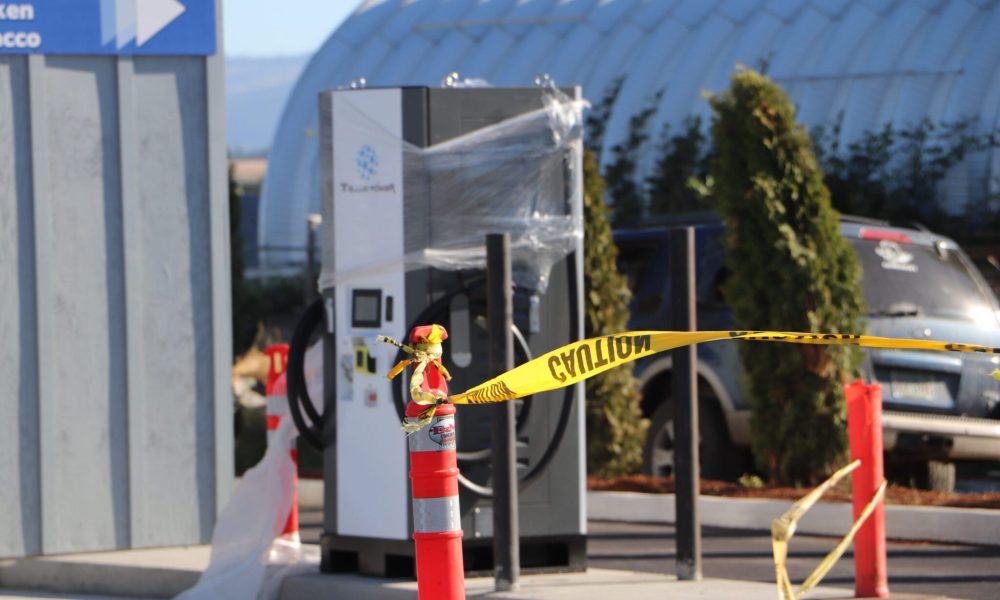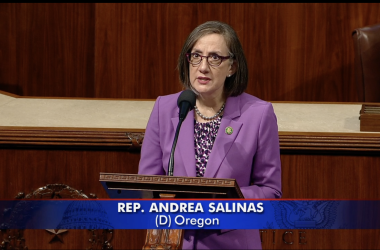Oregon’s Department of Environmental Quality has enforced stricter oversight of a clean energy program after issuing a $2.7 million fine, a record in its history.
The Clean Fuels Program, which aims to encourage greener transportation, has largely run on autopilot since it was created in 2016, with intermittent checks by officials. But last year DEQ discovered that a Lincoln City entrepreneur, Merlin Thompson, and his company, Thompson Technical Services, or TTS, had reported false data that allowed him to obtain $1.8 million worth of carbon credits. Thompson claimed his company had three electric vehicle charging machines that had dispensed millions of kilowatt hours of power to electric vehicles, more than was possible.
But none had been installed: Not even one vehicle had been charged. In taking enforcement action against the company, DEQ called TTS and Thompson “reckless” and suspended the company’s account in the Clean Fuels Program.
The Capital Chronicle unraveled the deception in an investigation, based on public records and more than a dozen interviews. DEQ told the Chronicle it has tightened oversight of the Clean Fuels Program, which rewards companies supplying clean fuels, like electricity for electric vehicles, with credits that can be sold to companies emitting carbon dioxide that need to show reductions in their contribution to such emissions.
Colin McConnaha, manager of the Clean Fuels Program for DEQ, said that Thompson’s false data reporting was unprecedented and that the agency would have caught it eventually. DEQ has two staffers dedicated to reviewing quarterly reports submitted by companies registered with the Clean Fuels Program. The analysts would have noticed that the charges Thompson had reported were wrong, said Harry Esteve, a DEQ spokesman.
But nothing had been flagged by the agency even two months after Thompson submitted TTS’ first report in June. It wasn’t until Sept. 30 that DEQ issued an enforcement letter.
McConnaha said DEQ has since asked staff in charge of reviewing reports to monitor credit transfers daily and to supply weekly summaries to team leaders.
“More often than not, there’s no activity in a day. So it’s just taking a look every day to see what’s happening,” McConnaha said.
The agency also has recently implemented a new requirement for third-party verification designed to validate information reported by companies generating carbon credits, Esteve said.
In response to the TTS’ case, Esteve said the agency is exploring the possibility of upgrading its reporting software to automatically catch inflated vehicle charging data when they’re entered into the Clean Fuels Program accounts.
I made the decision that no way am I going to allow this to happen again to me.
– Danny Takhar, carbon credit broker
But that’s not enough, said Danny Takhar, a carbon credit broker based in Vancouver, British Columbia. He got caught up in the deception by brokering the $1.8 million sale of TTS’ carbon credits to a Canadian fossil fuel supplier. He thought Thompson had earned the credits legitimately.
He’s not received his $226,000 fee, and now is one of several people who say Thompson owes them money.
Takhar wants to know how Thompson was even allowed to register TTS with the Clean Fuels Program as an electric vehicle charging company.
“The vetting process is faulty. How does someone walk away with so much money?” Takhar said, referring to the $1.8 million TTS got on the sale of invalid credits.
Thompson is appealing the $2.7 million fine. When issuing it, DEQ told Thompson he was barred from the Clean Fuels Program but that decision awaits the outcome of the fine.
In the meantime, Thompson has a new endeavor. On Oct. 26, about a month after getting fined, he registered a new company with the Oregon Secretary of State’s Office with a slightly different name: TTS EV Charging Corp. In an Oct. 31 Facebook message from Thompson to a former employee obtained by the Capital Chronicle, Thompson said he was installing three chargers in Pendleton, 12 in Boardman, six in Waitsburg and nine in Milton.
As for Takhar, he is more closely scrutinizing the companies he works with and where those companies are getting their carbon credits.
“I’ve tightened up my due diligence. We have to internally,” Takhar said. “I made the decision that no way am I going to allow this to happen again to me.”
Oregon Capital Chronicle is part of States Newsroom, a network of news bureaus supported by grants and a coalition of donors as a 501c(3) public charity. Oregon Capital Chronicle maintains editorial independence. Contact [email protected]. Follow Oregon Capital Chronicle on Facebook and Twitter.

Alex Baumhardt has been a national radio producer focusing on education for American Public Media since 2017. She has reported from the Arctic to the Antarctic for national and international media, and from Minnesota and Oregon for The Washington Post. She previously worked in Iceland and Qatar and was a Fulbright scholar in Spain where she earned a master's degree in digital media. She's been a kayaking guide in Alaska, farmed on four continents and worked the night shift at several bakeries to support her reporting along the way.









